新版剑桥少儿英语剑桥二级下册教案
- 格式:doc
- 大小:284.50 KB
- 文档页数:37
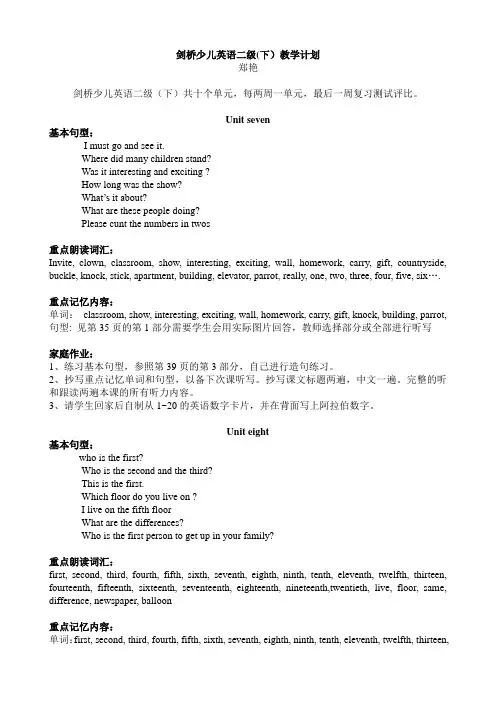
剑桥少儿英语二级(下)教学计划郑艳剑桥少儿英语二级(下)共十个单元,每两周一单元,最后一周复习测试评比。
Unit seven基本句型:I must go and see it.Where did many children stand?Was it interesting and exciting ?How long was the show?What’s it ab out?What are these people doing?Please cunt the numbers in twos重点朗读词汇:Invite, clown, classroom, show, interesting, exciting, wall, homework, carry, gift, countryside, buckle, knock, stick, apartment, building, elevator, parrot, really, one, two, three, four, five, six….重点记忆内容:单词:classroom, show, interesting, exciting, wall, homework, carry, gift, knock, building, parrot, 句型: 见第35页的第1部分需要学生会用实际图片回答,教师选择部分或全部进行听写家庭作业:1、练习基本句型,参照第39页的第3部分,自己进行造句练习。
2、抄写重点记忆单词和句型,以备下次课听写。
抄写课文标题两遍,中文一遍。
完整的听和跟读两遍本课的所有听力内容。
3、请学生回家后自制从1~20的英语数字卡片,并在背面写上阿拉伯数字。
Unit eight基本句型:who is the first?Who is the second and the third?This is the first.Which floor do you live on ?I live on the fifth floorWhat are the differences?Who is the first person to get up in your family?重点朗读词汇:first, second, third, fourth, fifth, sixth, seventh, eighth, ninth, tenth, eleventh, twelfth, thirteen, fourteenth, fifteenth, sixteenth, seventeenth, eighteenth, nineteenth,twentieth, live, floor, same, difference, newspaper, balloon重点记忆内容:单词:first, second, third, fourth, fifth, sixth, seventh, eighth, ninth, tenth, eleventh, twelfth, thirteen,fourteenth, fifteenth, sixteenth, seventeenth, eighteenth, nineteenth,twentieth,句型: 见第46页的第4部分需要学生记忆,教师选择部分或全部进行听写家庭作业:1、练习基本句型,跟读磁带把第45页的第3部分读熟直至能背下来。
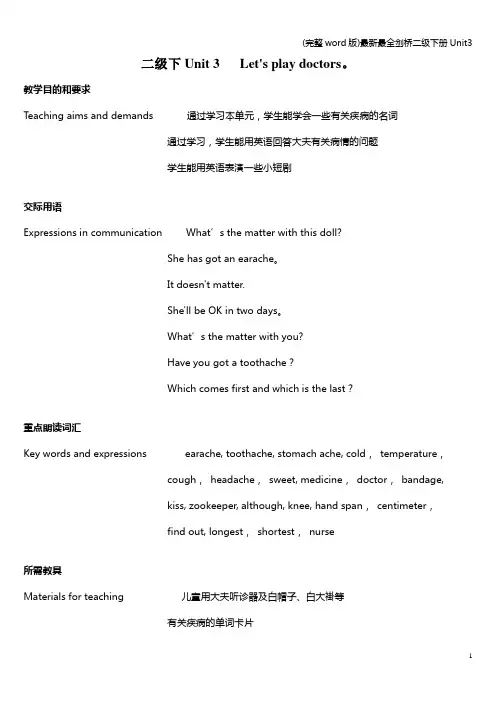
二级下Unit 3 Let's play doctors。
教学目的和要求Teaching aims and demands 通过学习本单元,学生能学会一些有关疾病的名词通过学习,学生能用英语回答大夫有关病情的问题学生能用英语表演一些小短剧交际用语Expressions in communication What’s the matter with th is doll?She has got an earache。
It doesn't matter.She'll be OK in two days。
What’s the matter with you?Have you got a toothache?Which comes first and which is the last?重点朗读词汇Key words and expressions earache, toothache, stomach ache, cold,temperature,cough,headache,sweet, medicine,doctor,bandage,kiss, zookeeper, although, knee, hand span,centimeter,find out, longest,shortest,nurse所需教具Materials for teaching 儿童用大夫听诊器及白帽子、白大褂等有关疾病的单词卡片相关的动物玩具(第三部分)纱布若干把小尺子如何导入教学?上课时,教师可以穿上一件白大褂对学生说:“What am I?Guess!” 如果学生猜出是大夫,教师说:“Yes,you are right. I'm a doctor. Do you often go to see the doctors in hospital? For what reason do you often go to see a doctor?” 教师让大家谈论疾病的内容,如果某个学生正好说出“感冒”,教师就可以给出英文单词“cold”.接着,教师可以带着大家一起学习一下相关的词汇,比如earache, headache, stomach ache, toothache, cold,temperature, cough 等。
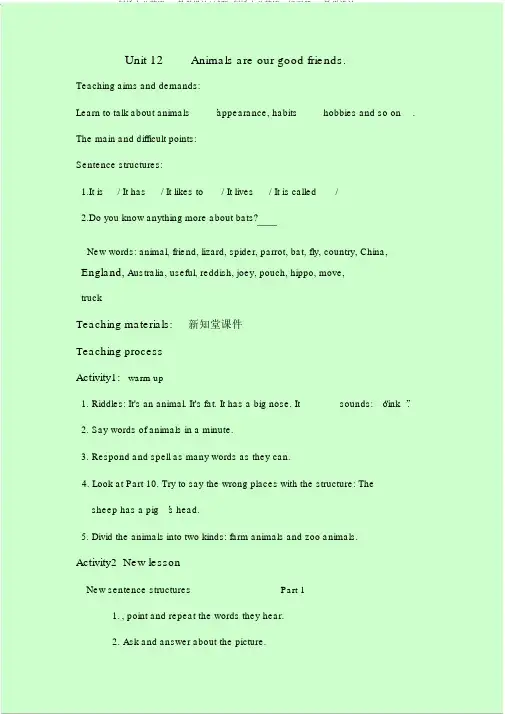
Unit 12Animals are our good friends.Teaching aims and demands:Learn to talk about animals’appearance, habits hobbies and so on. The main and difficult points:Sentence structures:1.It is / It has/ It likes to/ It lives/ It is called/2.Do you know anything more about bats?New words: animal, friend, lizard, spider, parrot, bat, fly, country, China, England, Australia, useful, reddish, joey, pouch, hippo, move,truckTeaching materials:新知堂课件Teaching processActivity1:warm up1. Riddles: It's an animal. It's fat. It has a big nose. It sounds:“oink”.2.Say words of animals in a minute.3.Respond and spell as many words as they can.4.Look at Part 10. Try to say the wrong places with the structure: Thesheep has a pig’s head.5. Divid the animals into two kinds: farm animals and zoo animals.Activity2 New lessonNew sentence structures Part 11., point and repeat the words they hear.2.Ask and answer about the picture.1)What ’s the English name of鹦鹉?2)Where is the parrot?3)What color is the parrot?4)What do Parrots like eating?5)What ’s parrot like?3. Teacher points at one of the animals in the picture and say apassageEg:It ’s a monkey. It’s brown. It has a long tail. It lives on the tree in the forest. It likes eating bananas. It is called猴子。
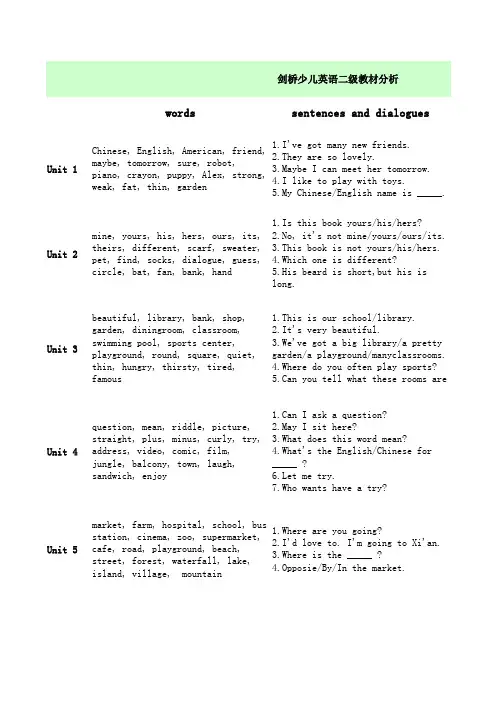
Unit 1 Unit 2 Unit 3 Unit 4Unit 51.Where are you going?2.I'd love to. I'm going to Xi'an.3.Where is the _____ ?4.Opposie/By/In the market.1.This is our school/library.2.It's very beautiful.3.We've got a big library/a prettygarden/a playground/manyclassrooms.4.Where do you often play sports?5.Can you tell what these rooms are1.Can I ask a question?2.May I sit here?3.What does this word mean?4.What's the English/Chinese for_____ ?6.Let me try.7.Who wants have a try?1.Is this book yours/his/hers?2.No, it's not mine/yours/ours/its.3.This book is not yours/his/hers.4.Which one is different?5.His beard is short,but his islong.mine, yours, his, hers, ours, its,theirs, different, scarf, sweater,pet, find, socks, dialogue, guess,circle, bat, fan, bank, handbeautiful, library, bank, shop,garden, diningroom, classroom,swimming pool, sports center,playground, round, square, quiet,thin, hungry, thirsty, tired,famousquestion, mean, riddle, picture,straight, plus, minus, curly, try,address, video, comic, film,jungle, balcony, town, laugh,sandwich, enjoymarket, farm, hospital, school, busstation, cinema, zoo, supermarket,cafe, road, playground, beach,street, forest, waterfall, lake,island, village, mountain剑桥少儿英语二级教材分析Chinese, English, American, friend,maybe, tomorrow, sure, robot,piano, crayon, puppy, Alex, strong,weak, fat, thin, gardensentences and dialogueswords1.I've got many new friends.2.They are so lovely.3.Maybe I can meet her tomorrow.4.I like to play with toys.5.My Chinese/English name is _____.Unit 6 Unit 7 Unit 8 Unit 9Unit 10 Unit 11Australia,Britain,giraffe,sailfish,whale, snowman, mountain, tallest,shortest,strongest, weakest, land,river, travelfilm, movie, photo, mask, hill,shark, parrot, pond, gave, square,wood, wonderful, together, saw,took, gave, spoke, bought, climbed,missing, painted, played,get up, picture book, reading anewspaper, washing up, cleaning thefloor, cookery book, comic book,bouncings, riding a horse, doingmaths, playing the pianolitter, animal, dolphin, grass,sky, throw, try, shout, pick, ride,kick, climb, showerBen, Sally, Jane, Daisy, John, Sue,Fred, Sam, Ann, Peter, Fred, Paul,Jim, hundred, thousand, kilometers,shorter, smaller, older, thinner,longer, bigger, younger, fatter,twicewinner, problem, stick, coffee,fun, pot, whose, turn, start,opposite, different, boring, fun,naughty, meaning, odd, even,1.Let's play the game.2.I'll do the _______.3.What have you got in your bag?4.Which school do you like to goto?1.Sally is taller/fatter than Ben.2.Which of these two buildings islonger/taller/bigger?3.She is afraid of snakes.4.He often wears a shirt.1.What does _____ like doing best?2.He likes drawing/reading/washing.3.What kind of books do you like toread?4.I like to read picture books.1.You mustn't drop litter in thepark.2.There is a parrot standing on abook.3.There are two cats sleeping inthe big shoe.1.What can/can't you easily do whenyou are very tall?2.How tall are you?3.I am one-hundred and forty-ninecentimetres tall.4.Which animal is the biggest ofthe three?1.Where did you go yesterday?2.I went to the zoo yesterday.3.What did Nancy do at the zoo?4.Did you see a lot of animals?Unit 12 Unit 13 Unit 14 Unit 15 Unit 16visit, famous, around, show,indoor, learn, think, cupboard,minute, digit, kangaroo, story,London, Thames, Cambridge, video-camera1.Has your family got a pool/book?2.Have you ever seen a tiger?3.Yes, I have./No, I haven't.4.What big eyes have you got?5.How many bikes has your familybought?market, bean, angry, throw,beanstalk, castle, monster, fairy,seed, correct, order, onions, soup,1.It's the day between Sunday andTuesday.2.We meet each Wednesday at 7 p.m..3.At what time are you free?4.Which one would you like to goto?1.How often does he _______ ?2.What's your favourite colour?3.What sports do you enjoy playing?4.What do you wear on you feet?5.How many pupils are there in _?1.I enjoy reading picture stories.2.Which comes first?3.What happens next?4.Match the ones that sound alike.5.Can you spot them all?1.Where are the animals?2.What do we have for breakfast?3.Who is your friend?4.Where do you live?5.What do you want to drink?6.How about making a _______ ?7.Catch it!beans, rice, chicken, cheese, beef,steak, juice, chocolate, fries,pasta, pie, bread, cakes, sea food,milk, butter, vegetable, tea,anytime, sometimes, rarelywinter, snowy, skating, hide-and-seek, snowflake, hooray, holiday,cinema, guitarMonday, Tuesday, Wednesday,Thursday, Friday, Saturday, Sunday,workday, Btitain, pasta, coconut,lemon, sausages, cheese, coffee,lemonade, tie, rock, between,under, behinddifficulties 1.当天学习单词和句子2.听当天所学习录音磁带30分钟.3.以家为中心画一张地图,并用英文标出地点的名称.1.了解和掌握常见公共场所和名胜古迹的英文名称.1.掌握有关地点名称的单词.2.Where is the ____?3.介词短语4.动名词做后置定语 1.当天学习单词和句子2.听当天所学习录音磁带30分钟.3..熟读第二部分的句子,自己编写一个类似的片段.1.当天学习单词和句子2.听当天所学习录音磁带30分钟.3.写一篇介绍自己学校的短文.1.熟练运用本课所学知识对学校进行介绍.1.了解学校的基本设施的英文名称.2.where引导的特殊疑问句及回答.3.形容词的熟练运用.1.多种方式提问老师的句子.2.学会用字典查找自己想找的词汇.1.学习并掌握课文中出现的对老师提问的所有句子. 1.当天学习单词和句子2.听当天所学习录音磁带30分钟.3.查阅以下单词的用法和中文意思.beach/cinema/station/market/waterfall/island/mountain/village/forest/river1.用英语简单介绍自己的朋友2.掌握like的基本用法stress 1.当天学习单词和句子2.听当天所学习录音磁带30分钟.3.学生准备一张自己的照片,并写一个自我介绍.homework1.和朋友进行简单的英文交谈.1.能够熟练使用一般疑问句的单数形式进行问答.2.用英文说出两张图片之间的不同. 1.学生能够初步掌握名词性物主代词的用法.1.掌握一般过去时的肯定/否定/一般疑问/特殊疑问句形式.1.当天学习单词和句子2.听当天所学习录音磁带30分钟.3.朗读第二部分录音.4.用英文给自己的父母讲三只小熊的故事.家长签字.1.当天学习单词和句子2.听当天所学习录音磁带30分钟.3.用mustn't 写出10条班级规定.1.Review.1.当天学习单词和句子2.听当天所学习录音磁带30分钟.3.熟读第六部分绕口令,和父母比赛,家长签字.1.掌握形容词的比较级形式和用法.1.当天学习单词和句子2.听当天所学习录音磁带30分钟.3.写出10个四位数数字的英文版.1.掌握形容词的最高级形式和用法. 1.当天学习单词和句子2.听当天所学习录音磁带30分钟.3.用最高级写出5个句子.4.用英文回答下列句子:Who is thetallest/shortest/strongest/thinnest person in your family?1.一般现在时动词单数第三人称的用法及掌握. 1.当天学习单词和句子2.听当天所学习录音磁带30分钟.3.完成第九部分内容.4.用英文写出一段文字介绍父母.1.掌握含有情态动词can't,mustn't的指令性句子.1.Review.1.掌握形容词的比较级形式及用法.2.对于身高的描述.3.能够认读四位数字.4.10个左右新英文名字的认读和记忆.1.一般现在时的特殊疑问句问答.What do you like doing?What does he like doing?2. 动名词短语.3.现在进行时问答.1.情态动词must的否定用法.2.There be句型的单复数形式.1.掌握形容词最高级的形式和用法.2.能够认读图标数据,并用英文进行简单说明.3.了解一些世界之最.1.复习并巩固一般过去时的用法.2.掌握一定数量的动词过去式形式.1.review.2.巩固数和名词所有格的概念及用法.1.当天学习单词和句子2.听当天所学习听力磁带30分钟.3.学生在家用英文提问父母10个问题,内容不限,家长签字.1.How often 引导的特殊疑问句.2.用英文复述本单元故事.1.当天学习单词和句子2.听当天所学习录音磁带30分钟.3.学生用所学习句型给父母提问5个问题,家长签字.1.review.2.能够直接用英文讲述故事/图片等等.1.当天学习单词和句子2.听当天所学习听力磁带30分钟.3.学生自己设计两张大致相同的图片,用英文向家长描述出不同点,家长签字.1.掌握现在完成时的肯定/否定/一般疑问句形式.1.当天学习单词和句子2.听当天所学习录音磁带30分钟.3.学生找出5张过去在不同地方的照片,并用I have been to ___.造句.1.能够用英文谈论自己一天的活动.1.当天学习单词和句子2.听当天所学习录音磁带30分钟.3.写一篇介绍自己上周活动的短文.1.现在完成时的概念和基本用法.2.动词过去式/过去分词.3.现在进行be going to句型表将来的用法.1.星期词汇.2.食物词汇.3.表示时间和方位的介词短语.4.表示生活和学习的动词短语.1.How often/many 引导的特殊疑问句.2.What引导的特殊疑问句.3.食物词汇.4.星期词汇.1.review.2.动词enjoy的用法.3.用一般过去时叙述主题故事.4.掌握一定数量的动词和介词短语.1.review.2.现在进行时和一般过去时的表达.3.How many/about引导的特殊疑问句.4.I like 的肯定和否定表达.和句子抄写10遍.所学习录音磁带30分钟.中心画一张地图,并用英点的名称.和句子抄写10遍.所学习录音磁带30分钟.第二部分的句子,自己编似的片段.和句子抄写10遍.所学习录音磁带30分钟.介绍自己学校的短文.和句子抄写10遍.所学习录音磁带30分钟.下单词的用法和中文意/cinema/station/marke all/island/mountain/ forest/river和句子抄写10遍.所学习录音磁带30分钟.备一张自己的照片,并写介绍.work和句子抄写10遍.所学习录音磁带30分钟.二部分录音.给自己的父母讲三只小.家长签字.和句子抄写10遍.所学习录音磁带30分钟. n't 写出10条班级规定.和句子抄写10遍.所学习录音磁带30分钟.六部分绕口令,和父母比签字.和句子抄写10遍.所学习录音磁带30分钟.个四位数数字的英文版.和句子抄写10遍.所学习录音磁带30分钟.级写出5个句子.回答下列句子:heshortest/strongest/ person in your和句子抄写10遍.所学习录音磁带30分钟.九部分内容.写出一段文字介绍父母.和句子抄写10遍.所学习听力磁带30分钟.家用英文提问父母10个容不限,家长签字.和句子抄写10遍.所学习录音磁带30分钟.所学习句型给父母提问5家长签字.和句子抄写10遍.所学习听力磁带30分钟.己设计两张大致相同的英文向家长描述出不同签字.和句子抄写10遍.所学习录音磁带30分钟.出5张过去在不同地方的用I have been to ___.和句子抄写10遍.所学习录音磁带30分钟.介绍自己上周活动的短。

(完整版)剑桥少儿英语二级下册剑桥少儿英语二级-下册必需把握的内容Unit one基本句型: Where would you like to go in the holiday?I’d like to go to the countrysideWhere did you go on the holiday?Did you go to Huang Mountain?What other places did you go to ?I’m sure you had a good time.That’s greatHe couldn’t use the pen now, so he had to use a pencil.重点朗读词汇:Jungle, forest, lake, plant, island, countryside, field, village, river, waterfall, mountain, cinema, bank, zoo, supermarket, hospital, library, park, India, nun, surprised, poor, homeless, people, famous重点记忆内容:单词:forest, lake, island, field, village, river, cinema, bank, hospital, library, park,句型: 见第3页的第3部分需要同学记忆家庭作业:1、练习基本句型,跟读磁带把第4页的第4部分读熟。
2、抄写重点记忆单词和句型。
完整的听和跟读两遍本课的全部听力内容。
3、请同学依据本单元的第五部分写出五句话分别回答所给的问题。
基本句型:What’s the weather like today?It’s sunnyI like sunny days because I can do many things outside.I don’t like rainy days because it’s wet outsideWhere are they going today?What can you do when you cycle in the country?重点朗读词汇:Weather, rainy, windy, snowy, cloudy, rainbow, sunny, because, outside, enjoy, soccer, beach, snowflake, sunset, dark, light, mean, along, sea, bicycle, cousin, grandparent, different, Daisy, Fred, Nick.重点记忆内容:单词:Weather, rainy, windy, snowy, cloudy, rainbow, sunny,句型: 见第7--8页的第1部分需要同学记忆家庭作业:1、练习基本句型,跟读磁带把第12页的第9部分读熟直至能背下来。
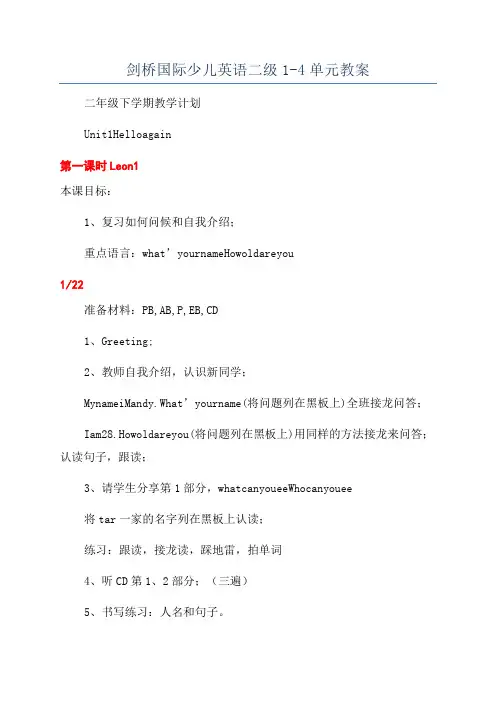
剑桥国际少儿英语二级1-4单元教案二年级下学期教学计划Unit1Helloagain第一课时Leon1本课目标:1、复习如何问候和自我介绍;重点语言:what’yournameHowoldareyou1/22准备材料:PB,AB,P,EB,CD1、Greeting;2、教师自我介绍,认识新同学;MynameiMandy.What’yourname(将问题列在黑板上)全班接龙问答;Iam28.Howoldareyou(将问题列在黑板上)用同样的方法接龙来问答;认读句子,跟读;3、请学生分享第1部分,whatcanyoueeWhocanyouee将tar一家的名字列在黑板上认读;练习:跟读,接龙读,踩地雷,拍单词4、听CD第1、2部分;(三遍)5、书写练习:人名和句子。
6、结束本课。
7、作业:完成作业单,并能认读作业单上的句子和单词;第二课时Leon2本课目标:1、继续复习问候语;2、能熟练运用句型Who’he/heHe/hei…并能进行熟练问答;重点语言:Who’he/heHe/hei…Star一家的名字准备材料:PB,AB,P,EB,CD,1、Greeting;2、教师书写上节课的句子和人名,提问学生认读;再书写几个大2/22写或者小写字母,请学生写出它们的大小写或者前后相邻字母;3、请学生观察第3部分图片,能看到什么?邀请一位同学读一下Trevor的话,教师将最后一个句子who’heHeiMrStar.列在黑板上.教师继续模仿句型来提问who’he/who’he完成图片上所有人物的问答;4、教师在班级走动,将所有同学的名字都提问一遍;5、听CD;6、练习书写;7、结束本课。
8、完成练习单并熟练认读单词;第三课时Leon3本课目标:1、复习26个字母;2、会说chant.重点语言:26个字母准备材料:PB,AB,P,EB,CD1、Greeting;2、复习26个字母,做字母游戏:TPR,抢答游戏,接龙游戏;3、听第5部分CD,跟唱;4、教师提问:WhatcoloritheletteraIt’grey.同样提问h,j,k教师连读,请学生感受这几个发音的共同之处;WhatcoloritheletterbIt’green.3/22WhatcoloritheletterfIt’red.WhatcoloritheletteriIt’white.WhatcoloritheletterwIt’blue.5、教师将26个字母列在黑板上,邀请每位同学回答一个问题:what’thiThelettera/b/c……6、书写字母2遍;7、结束本课。
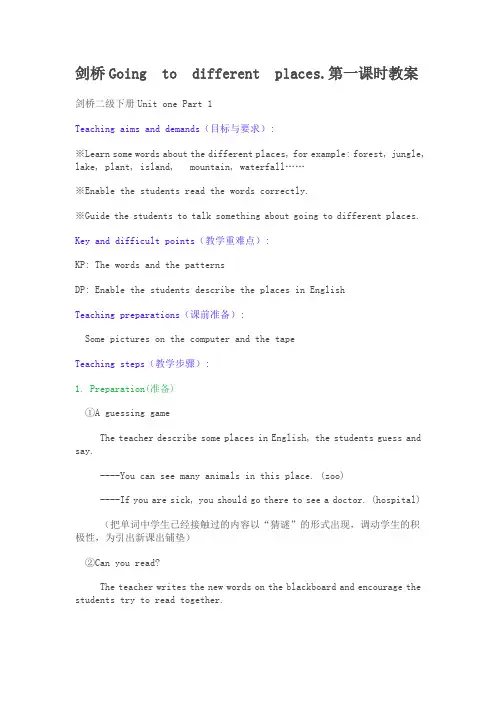
剑桥Going to different places.第一课时教案剑桥二级下册Unit one Part 1Teaching aims and demands(目标与要求):※Learn some words about the different places, for example: forest, jungle, lake, plant, island, mountain, waterfall……※Enable the students read the words correctly.※Guide the students to talk something about going to different places.Key and difficult points(教学重难点):KP: The words and the patternsDP: Enable the students describe the places in EnglishTeaching preparations(课前准备):Some pictures on the computer and the tapeTeaching steps(教学步骤):1. Preparation(准备)①A guessing gameThe teacher describe some places in English, the students guess and say.----You can see many animals in this place. (zoo)----If you are sick, you should go there to see a doctor. (hospital)(把单词中学生已经接触过的内容以“猜谜”的形式出现,调动学生的积极性,为引出新课出铺垫)②Can you read?The teacher writes the new words on the blackboard and encourage the students try to read together.jungle island waterfall coun tryside field(出示新单词,鼓励学生自学)2. Presentation(呈现):①Listen and repeatThe teacher plays the tape and asks the students to read them out.②Who can write down the words on the blackboard?3. Practice(操练):①Follow the teacherAsk the students to read the words after teacher, the teacher shows them the phonetic symbols.(老师出示各个单词的元音,引导学生通过看音标读单词)②Pupil TeacherAsk some students to act like a teacher and guide the others to read the new words. The teacher should pay attention to the sounds.(小老师带读,锻炼学生,但老师要关注单词读音)③List en and repeatMake the students listen to the tape and repeat the new words.(要求学生跟录音读,确定语音语调)④Sentence Pattern----Where are you going now?----I’m going to the zoo.----Where would you like to go in the holiday then?----I’d like to go to t he countryside.4. Production(产出)Encourage the students talk some about the different places, for example: I’d like to go to see the waterfall. The water falls straight down over a big rock. It’s beautiful.Exercises in class(课堂练习)※ Read and write t he words.1. land that is outside cities and towns (countryside)2. a building in which films are shown (cinema)3. a forest with lots of plants growing very close together (jungle)4. water that falls straight down over a big rock (waterfall)5. a piece of land surrounded by water (island)6. a large open area with grass and trees (field)7. a large area of water surrounded by land (lake)Homework(家庭作业):Read and copy the words in part one.Blackboard Design(板书设计): (略)Teacher’s Notes(教学反思):本课单词量较大,涉及的一些单词是在PEP教材上出现过的,有的是要求听、说、读、写的四会单词,有的是要求认读的单词,感觉两个班较多的学生对于四会单词记得还算比较牢,但对于那些要求认读的单词,如forest,jungle,field,island等印象并不深刻。
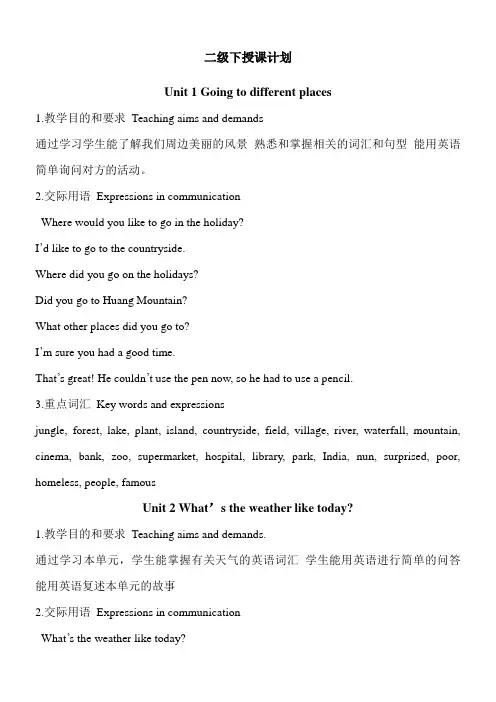
二级下授课计划Unit 1 Going to different places1.教学目的和要求Teaching aims and demands通过学习学生能了解我们周边美丽的风景熟悉和掌握相关的词汇和句型能用英语简单询问对方的活动。
2.交际用语Expressions in communicationWhere would you like to go in the holiday?I’d like to go to the countryside.Where did you go on the holidays?Did you go to Huang Mountain?What other places did you go to?I’m sure you had a good time.That’s great! He couldn’t use the pen now, so he had to use a pencil.3.重点词汇Key words and expressionsjungle, forest, lake, plant, island, countryside, field, village, river, waterfall, mountain, cinema, bank, zoo, supermarket, hospital, library, park, India, nun, surprised, poor, homeless, people, famousUnit 2 What’s the weather like today?1.教学目的和要求Teaching aims and demands.通过学习本单元,学生能掌握有关天气的英语词汇学生能用英语进行简单的问答能用英语复述本单元的故事2.交际用语Expressions in communicationWhat’s the weather like today?It’s sunny. I like sunny days because I can do many things outside.I don’t like rainy days because it?s wet outside.Where are they going today?What can you do when you cycle in the country?4.重点词汇Key words and expressionsweather, rainy, windy, snowy, cloudy, rainbow, sunny, because, outside, enjoy, soccer, beach, snowflake, sunset, dark, light, mean, along, sea, bicycle, cousin, grandparent, different, Daisy, Fred, NickUnit 3 Let’s play doctors.1.教学目的和要求Teaching aims and demands.通过学习本单元,学生能学会一些有关疾病的名词通过学习,学生能用英语回答大夫有关病情的问题学生能用英语表演一些小短剧2.交际用语Expressions in communication.What’s the matter with this doll?She has got an earache. It doesn’t matter. She’ll be OK in two days. What’s the matter with you? Have you got a toothache? Which comes first and which is the last?3.重点词汇Key words and expressionsearache, toothache, stomach ache, cold, temperature, cough, headache, sweet, medicine, doctor, bandage, kiss, zookeeper, although, knee, hand span, centimetre, find out, longest, shortest, nurseUnit 4 I can see with my eyes.1.教学目的和要求Teaching aims and demands通过学习学生能掌握本单元的新句型学生能用表示五官的动词词汇讲述某件事学生能大量复习和巩固已有的英语词汇2.交际用语Expressions in communicationI can clean the elephant with a brush. I can smell the flowers with my nose. This animal uses its legs to catch food. What can you see in the picture? What body parts does a plant have?3. 重点朗读词汇Key words and expressionsclean, brush, different, use, climb, special, hear, smell, taste, touch, see, leaves, plants, ground, grow, upwards, similar, hand, leg, head, nose, mouth, ears, eyesUnit 5 Simon Paul lives in the country.1.教学目的和要求Teaching aims and demands通过学习本单元,学生能用英语简单谈论一些城市与农村的不同之处学生能初步掌握一些有关方位的介词短语通过大量练习,学生能掌握一些常用的动词短语2.交际用语Expressions in communicationWould you like to visit your cousin Bob in the city this weekend? I don?t like going to the city. There are too many cats. How about you, Peter? Would you like to go? Can I go there? I?ve never been to a big city. Where do you like living? I?d like living in the city. What can you do in the city? What can you do in the country?3.重点词汇Key words and expressionslive, country, visit, cousin, never, ready, nowhere, either, city, field, forest, island, mountain, remember, worry, somewhere, inside, outside, wait, picnic, breathe, sofa, stillUnit 6 I’d like a glass of water.1.教学目的和要求Teaching aims and demands通过学习本单元,学生应基本掌握英语量词的用法学生能进一步熟悉和巩固有关水果和食物的单词学生能用英语回答所给的问句并能讲述该单元的故事2.交际用语Expressions in communicationWhat would you like, Sir? I’d like a glass of water. How about a juice, Miss? Sorry. We don?t have any at the moment. I?d like a pair of sport shoes. Would you like a cup of tea? Yes, I would. Would you like a glass of milk? No, thank you.3.重点词汇Key words and expressions tea, coffee, glass, juice, bowl, soup, bottle,lemonade, moment, then, kilo, pasta, question, dialogue, cry, nothing, somebody, pick, slipUnit 7 I’ve got to go and see!1.教学目的和要求Teaching aims and demands通过学习本单元,学生应基本掌握英语量词的用法学生能进一步熟悉和巩固有关水果和食物单词学生能用英语回答所给的问句并能讲述该单元的故事2.交际用语Expressions in communicationI must go and see it. Where did many children stand? Was it interesting and exciting? How long was the show? What?s it about? What are these people doing? Please count the numbers in twos.3.重点词汇Key words and expressionsinvite, clown, classroom, show, interesting, exciting, wall, homework, carry, gift, countryside, count, buckle, knock, stick, apartment, building, elevator, parrot, really, one, two, three, four, five, six…Unit 8 Who is the first?1.教学目的和要求Teaching aims and demands通过学习本单元,学生能初步掌握英语的序数词的读法和写法通过阅读,学生能加强对阅读短文的理解学生能基本回答有关家庭成员的问题2.交际用语Expressions in communicationWho is the first? Who is the second and the third? This is the first. Which floor do you liveon? I live on the ninth floor. What are the differences? Who is the first person to get up in your family?3.重点词汇Key words and expressions first, second, third, fourth, fifth, sixth, seventh,eighth, ninth, tenth, eleventh, twelfth, thirteenth, fourteenth, fifteenth, sixteenth, seventeenth, eighteenth, nineteenth, twentieth, live floor, same, difference, newspaper, balloonUnit 9 I like sunny days but I don’t like rainy days.1.教学目的和要求Teaching aims and demands通过学习,学生能用英语简单谈论在不同天气里所做的活动通过练习,进一步掌握how many 和why 的问句形式和回答方式学生能进一步加强听力和朗读训练2.交际用语Expressions in communicationI like sunny days but I don?t like rainy days. I like to play on the beach, but I don?t like to play in the water. How many children like to play with sand? Why do you like sunny days? On a cold day I watched TV at home. 3.重点词汇Key words and expressions sand, games, boat, swim, sunbathe, ride, next, anything, trunk, cool, clap, much, potatoes, need, lower, note, outside, yummy, cute, face grace, woe, go bonny, blithe, gay, cloudy, windy, fine, sunny, cold, hotUnit 10 Let’s guess.1.教学目的和要求Teaching aims and demands通过游戏,学生能进一步提高学习外语的兴趣进一步复习相关的词汇,如动物、水果及食物、衣物、房间用具、文具等学生能对定语从句有个初步的了解2.交际用语Expressions in communicationLet’s guess. How many things beginning with letter C ?Can you find in this picture? She is a person who teaches children at school. This is a person who can make you happy. When did he come here? 3.重点词汇Key words and expressionsguess, panda, dress, clown, plane, uncle, aunt, computer, teacher, hippo, rabbit, camera, television, pirate, parrot, treasure, pick, bear, rock, know, moustacheUnit 11 What’s your hobby?1.教学目的和要求Teaching aims and demands通过学习本单元,学生能进一步提高学习英语的兴趣初步了解和掌握like to 后面跟不定式的用法及like 后面跟动名词的用法学生能用英语简单谈论个人的爱好2.交际用语Expressions in communication ?What?s your hobby?I like to play table tennis. I like flying a kite. Do you like reading books? Yes, I do. Do you like dancing? No, I don?t. What did you do yesterday? I went fishing yesterday.3.重点词汇Key words and expressionshobby, table tennis, badminton, fishing, football, piano, comic, baseball, radio, party, hockey, basketball, computer games, skating, film, kite, beach Unit 12 Animals are ourgood friends.1.教学目的和要求Teaching aims and demands通过学习本单元,学生能进一步增强热爱动物及保护动物的意识全面复习和巩固有关动物的名词学生能用英语简单复述本单元的故事2.交际用语Expressions in communicationAnimals are our good friends. Let’s invite our beautiful rabbit to sing us a song. Do I have to sing a song? Are bats useful animals? What do bats eat? Do bats have eyes? A duck is a pet. What animals are they?3.重点词汇Key words and expressions animal, friend, lizard, spider, parrot, giraffe,tiger, bat, fly, lion, bear, goat, puppy, kangaroo, panda, chicken, country, China, America, English, Australia, useful, reddish, joey, pouch, hippo, move, truckUnit 13 I can spot the frog, can you?1.教学目的和要求Teaching aims and demands通过学习本单元,学生能进一步增强认真观察的能力,学生能进一步掌握Can you…?句型的用法通过学习,学生能比较熟练地使用不同类型的问句和答语2.交际用语Expressions in communicationI can spot the elephant, can you? He went to the cafe to have a drink. Can you go shopping with me? Sorry, I have no time. How high can a kangaroo hop? Why can?t I see in the dark? How can you do that?3.重点词汇Key words and expressionsspot, bookshop, cafe, shop, giraffe, turtle, Chinese, sorry, crocodile, mountain, climb, piano, underground, angry, stop, train, push, pick, happen, nextUnit 14 There isn’t any bread in the kitchen!1.教学目的和要求Teaching aims and demands通过学习本单元,学生能初步了解可数名词和不可数名词的区别学生能掌握There is…或There are…这两个句型的基本结构能用英语表演本单元的小短剧和小对话2.交际用语Expressions in communication ? ? There is a hungry dog between the trees.There are two big clocks on the table. There There There There is only some milk.are only some apples. isn?t any bread in the kitchen! aren?t any eggs in the bag.3.重点词汇Key words and expressions kitchen, lemons, potatoes, beans, carrots,pineapples, chips, oranges, coconuts, tomatoes, pears, chicken, cheese, fish, milk, water, rice, bread, soupUnit 15 Let’s find it quickly!1.教学目的和要求Teaching aims and demands通过学习本单元,学生能进一步提高观察能力初步了解和掌握形容词和副词的用法能够用英语描述某件东西及某个动物的方位2.交际用语Expressions in communicationLet’s find it quickly. Where?s the giraffe? It’s behind the van. How did the train go? The train went slowly. What do you want to buy? How much does it cost in all?3.重点词汇Key words and expressions behind, between, under, lion, parrot, snake,crocodile, tiger, slowly, happily, beautifully, quickly, carefully, quietly, badly, differently, money, classroom, cost, spoon, race, dinner, cookies, bell, taste, basement, film, snowflake, teeth, floor, balcony, shoulderUnit 16 He can do better than his brother!1.教学目的和要求Teaching aims and demands通过学习本单元,学会与人简单交流的话语综合复习各种问句,学会与人简单交流的话语学生基本能用英语复述本单元的故事2.交际用语Expressions in communicationHe can do better than his brother. How often do you eat cake? Why is she talking to him? What?s the weather like today? What?s your favourite colour? What?s your favourite animal? How much water do you want? When does the class begin? What?s the name of your school?3.重点词汇Key words and expressionsbetter, round, score, darts, throw, outer, ring, double, triple, same, sadly, miss, fair, bright, early, feel, wheel, circle, fix, space, opposite。
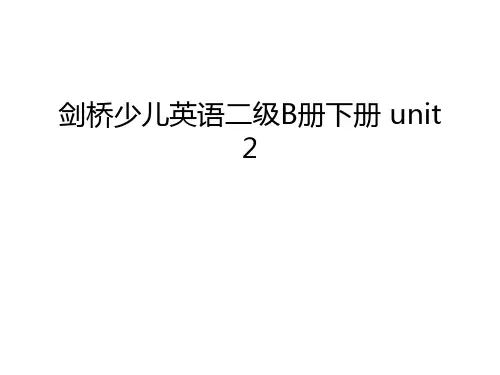
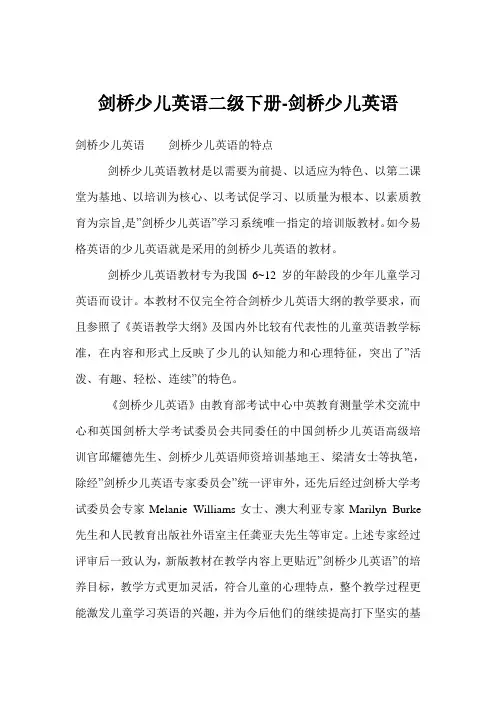
剑桥少儿英语二级下册-剑桥少儿英语剑桥少儿英语剑桥少儿英语的特点剑桥少儿英语教材是以需要为前提、以适应为特色、以第二课堂为基地、以培训为核心、以考试促学习、以质量为根本、以素质教育为宗旨,是”剑桥少儿英语”学习系统唯一指定的培训版教材。
如今易格英语的少儿英语就是采用的剑桥少儿英语的教材。
剑桥少儿英语教材专为我国6~12岁的年龄段的少年儿童学习英语而设计。
本教材不仅完全符合剑桥少儿英语大纲的教学要求,而且参照了《英语教学大纲》及国内外比较有代表性的儿童英语教学标准,在内容和形式上反映了少儿的认知能力和心理特征,突出了”活泼、有趣、轻松、连续”的特色。
《剑桥少儿英语》由教育部考试中心中英教育测量学术交流中心和英国剑桥大学考试委员会共同委任的中国剑桥少儿英语高级培训官邱耀德先生、剑桥少儿英语师资培训基地王、梁清女士等执笔,除经”剑桥少儿英语专家委员会”统一评审外,还先后经过剑桥大学考试委员会专家Melanie Williams女士、澳大利亚专家Marilyn Burke先生和人民教育出版社外语室主任龚亚夫先生等审定。
上述专家经过评审后一致认为,新版教材在教学内容上更贴近”剑桥少儿英语”的培养目标,教学方式更加灵活,符合儿童的心理特点,整个教学过程更能激发儿童学习英语的兴趣,并为今后他们的继续提高打下坚实的基础。
《剑桥少儿英语》具有如下特点:1、语言标准。
教材由具有多年亚洲儿童英语教学经验的英语专家编写,其编排设计充分考虑了儿童学习的特点,将相对枯燥的词汇、语法、语用及语音知识巧妙地融汇其中,生动、标准的语言为儿童的入门学习奠定了良好的基础。
2、贴近生活。
教材的内容真实反映了亚洲地区儿童生活的实际情况,对话、练习、歌曲、游戏都是孩子们生活中所喜闻乐见的,容易理解,便于接受。
3 、图文并茂。
教材的插图精美,与文字紧密配合,图画色调鲜明,生动活泼,极易调动儿童的学习兴趣和积极性。
4、音色清晰、优美。
标准的语言,配以动听的音乐,将听、说、读贯穿起来,让儿童在轻松愉快的氛围中掌握最基本的交际用语。
剑桥二级下册教案 Unit 1 Going to different places 教学目的和要求 Teaching aims and demands 通过学习学生能了解我们周边美丽的风景 熟悉和掌握相关的词汇和句型 能用英语简单询问对方的活动 交际用语 Expressions in communication Where would you like to go in the holiday? I‟d like to go to the countryside. Where did you go on the holidays? Did you go to Huang Mountain? What other places did you go to? I‟m sure you had a good time. That‟s great! He couldn‟t use the pen now, so he had to use a pencil. 重点朗读词汇 Key words and expressions
jungle, forest, lake, plant, island, countryside, field, village, river, waterfall, mountain, cinema, bank, zoo, supermarket, hospital, library, park, India, nun, surprised, poor, homeless, people, famous 所需教具 Materials for teaching 风景名信片或用过的风景挂历 有关地点的单词卡片 动词的过去式形式 短语词组卡片
教学步骤 Teaching procedures Warm up 教师首先简单总结上册重点内容,可问些问题或带领学生说唱大家印象比较深刻的chant, 并鼓励学生继续学好下册课程。 Presentation 上课时,教师首先给学生提出几个问题:‚Have you ever been to Shanghai? Did you go to Shanghai before? What other places have you been to?‛问了几个学生之后,教师便拿出风景图片问学生:‚Did you go to visit the Huang Mountain? Did you go to visit the jungle? Did you go to visit the waterfall?‛教师要根据自己手中有的风景图片进行提问。提问时,教师应注意把句型及其肯定回答和否定回答写在黑板上以便让学生了解要学习的句型。 a ) 引出话题后,教师便拿出许多单词卡片或风景图片对大家说:‚Now let‟s look at the pictures and say the words.‛教师边拿图片给大家看边带着大家熟悉这些单词。 b ) 在反复熟悉单词的基础上,教师教给学生句型:‚Where did you go last Saturday?‛‚I went to visit the jungle.‛让大家熟悉这两个句型后,教师让学生两人一组做问答练习。问答的时候,教师要让学生依次对每张图提问。 c ) 在学生练习的基础上,教师问学生:‚Where do you often go at school? I often go to the classroom and the library.‛等等(类似的词还有swimming pool, Art Centre, P.E. Centre, garden, school lab, reading room, Sports Centre等). d ) 教师示范后再让大家两人一组进行问答训练,并将单词放在句型中进一步熟悉。 Practice 单元教学活动2 Read and answer. 第二部分是谈论Fred的假期。首先教师要让学生会说这些地点的名称。特别是要带着动词的过去式形式一起说,让学生记住英语的动词短语、名词短语或介词短语。在学生熟悉的基础上,教师介绍说:‚Fred came back to school from a long holiday. Do you know which holiday is longer? The summer holiday or the winter holiday?‛问完之后,教师接着说:‚Fred came back from a long holiday. He went to many places and took many pictures. Please look at the pictures and say something about his holiday. You can say, „Fred played in the park. He climbed the Great Wall. He went to the zoo, etc.‟‛教师让两人一组进行陈述。最后,教师可以向全体学生提问:‚Where did Fred go last summer holiday?‛学生依次回答教师所提的问题。 单元教学活动3 Listen, read and act. 第三部分是对话练习。教师可以先让学生听一听录音,在听录音的基础上,两人一组进行练习,并能达到大家都说的目的,如果学生记得快并且记得比较好,教师应给学生奖励。 单元教学活动4 Listen, read and retell. 第四部分是一篇短文,介绍的是一名非常出色的修女。教师可以给学生一些有关Mother Teresa的生平事迹介绍(见知识扩展)。同时,教师要引导学生看文章时划出不明白的地方,教师适当做一些解释。最后,教师让学生在大量朗读的基础上进行复述和看图说话。活动的形式可以是个人或小组。 单元教学活动5 Listen, read and write. 第五部分是阅读部分,该短文是某学生的一篇日记。教师首先需提问学生:‚Have you ever been to Wutai Mountain? Would you like to go there in the future? Have you ever climbed a mountain? Is it very tall? Do you think it‟s easy to climb a mountain.‛学生回答了这些问题后,教师说:‚Now please read the passage on Page 4‘Climbing Wutai Mountain’. Read carefully and try to fill in the missing words. After you‟ve finished, you can also underline the sentences which you are not so sure of.‛ 教师让学生先自己阅读并填空。学生基本完成后,教师带着学生一起完成该任务。填空完成后,教师需带领学生读几遍该短文。待学生有些语感之后,教师问学生是否明白该短文的意思,也可以让学生提问老师。教师应教给学生说:‚May I ask you a question? What‟s the Chinese for…? What‟s the English for…?‛朗读时,教师要提醒学生特别注意动词过去式的读音。朗读两三遍之后,教师让学生看短文并提出问题,教师适当给予解释和说明,但不要讲得过细。随后,教师让学生念黑体字,这些都是动词的过去式形式。教师让学生将他们的原形动词写在下面的横线上。最后相互检查。 听力原文: Climbing Wutai Mountain Last summer, my parents and I took a trip to Wutai Mountain. It was my first time leaving home and traveling to a new place, so I was very excited. We got on the train and five hours later we arrived in a small city at the foot of the mountain. Early the next morning, we set out for our climb. The weather was nice, and I was running away ahead of my parents. But soon I had to slow down because the bag on my back was getting heavier and heavier. I wanted to ask my dad for help, but then I remembered I had promised him to carry my own bag. How could I go back on my word? So I pressed on. This famous mountain attracted many visitors. Among these visitors was a little girl from Japan. She was about five or six, and was carrying a bag as big as mine. When I learned that she had also climbed up herself, I was surprised. I went up to her and tried to help her. But she said,‘no’and she wanted to go on climbing the mountain with us. The rest of the way to the top was the most difficult. All of us were tired and thirsty. Besides, I had to keep an eye on the Japanese girl, pulling her up when the steps were too high. I kept on. By noon, we finally got to the top. My parents smiled at me. I knew they were proud of me because I had climbed up this high mountain on my own. 单元教学活动6 Read, find out and write. 第六部分需要学生谈论五个方面的问题。教师可以分别来问学生。首先教师可以让学生谈论放暑假时他们想去哪。为了让学生能说出句子,教师先拿出相关的图片或单词卡片让学生复习一下,比如Shanghai, Tianjin, Wuhan, mountain, waterfall, village, countryside, field, island, garden, lake, jungle, park等。然后,教师给出句型:‚Where would you like to go in the holiday? I‟d like to go to the countryside.‛教师要提醒学生地名前不要加任何的定冠词。 a ) 接着,教师提出问题:‚When you go to that place, what would you like to see? Do you like to see beautiful places? Do you like to visit parks, museums, zoos, gardens and shopping centres?‛ b ) “What would you like to eat?”教师引导学生说出所有有关食物的单词。‚I‟d like to eat eggs, fish, bananas, apples and chips.‛ c ) ‚What would you do? I would play games, watch movies, see animals, play soccer.‛等等。教师可以将一部分动词短语提供给学生,以便让他们随时选用。 d ) ‚Whom would you meet? Old friends, famous people, parents, brothers and sisters, etc.‛教师提